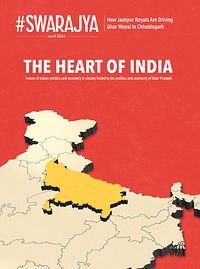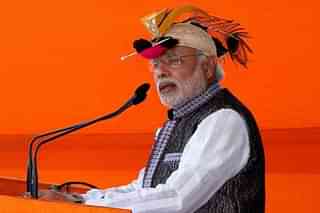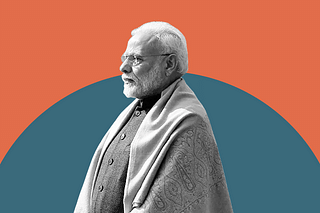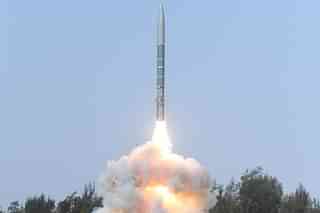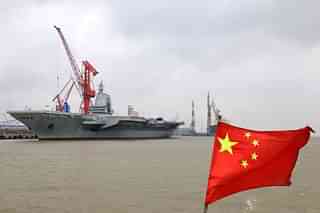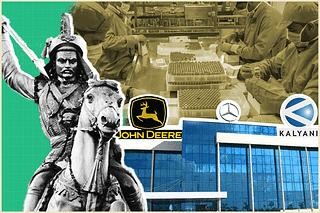Ideas
Needed: A Contemporary Public Broadcaster To Relate To The India Story
Swarajya Staff
Jun 06, 2017, 09:02 PM | Updated 09:02 PM IST
Save & read from anywhere!
Bookmark stories for easy access on any device or the Swarajya app.
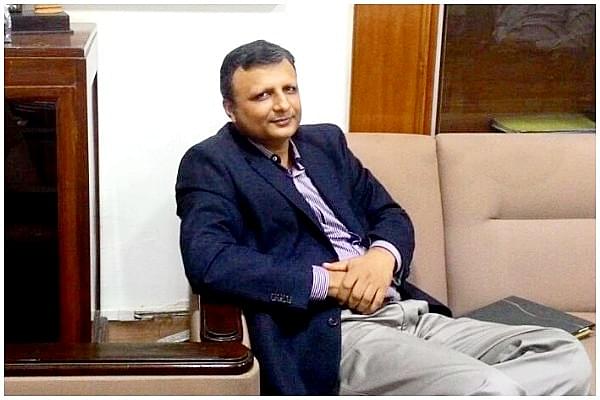
Shashi Shekhar Vempati, former CEO of Niti Digital, was recently named the chief executive officer (CEO) of Prasar Bharati. Prasar Bharati is the public broadcaster of India that runs Doordarshan (DD) television and All India Radio.
It will be the first time that a non-Indian Administrative Service (IAS) officer has been chosen to head the public broadcaster (interim CEO was also non-IAS). A graduate of IIT Mumbai, Vempati worked for several years with Infosys as a technology architect leading large scale IT transformation projects. A celebrated name in the blogosphere, he has written copiously in the intersection of politics, policy and technology.
Even as he prepares to take full charge in his new role, the soft-spoken 44-year-old, in a wide ranging interview to Swarajya, shared his vision for the public broadcaster, on how he plans to navigate through the digital disruption, on reconnecting with the younger demographics and host of other issues.
1. A decade back, the case for public broadcasters was quite strong as they were certainly addressing a market failure i.e lack of information access to a considerable section of the population. With the proliferation of private-run channels and their near universal reach, do you think a business case exists for continued funding of broadcasters?
I think it would be myopic to look at the role of the public broadcaster narrowly from a market standpoint in a country like India given our socio-economic diversity and complexity. As an open and vibrant democracy, we are blessed with a diverse choice of media both in terms of genres and languages. But not all of the private broadcast media reaches every corner of India both along our frontiers and within our hinterland. From putting the Indian national perspective across our frontiers to winning hearts and minds of every Indian deep inside our hinterland the public broadcaster has an important role.
There can be an open debate on how a public broadcaster ought to be funded. The Sam Pitroda Committee Report alludes to this as well with some suggestions on funding. While the private media has an important role to play in giving our citizens choice in a competitive marketplace, the public broadcaster has a unique role in being the voice of public interest and national interest. I see continued need for that role.
2. As someone who has been an astute commentator and in fact a pioneering figure in the world of digital media landscape in India, how do you think the public broadcasters can cope with the massive digital disruption that has structurally altered the relevance of conventional broadcast media?
Public broadcasters the world over have shown amazing ability to reinvent themselves for the digital era. By many digital metrics, the BBC is ranked top among digital news platforms worldwide. NPR (National Public Radio) in the USA has made a mark with an innovative mobile app to create a personalised listening experience. We need to do the same in India by digitally transforming our media platforms Doordarshan and All India Radio. We have a unique challenge in India due to our linguistic diversity. This is a digital opportunity and an area of strength given our ability to touch the lives of all Indians in their native languages across our network of platforms, channels, stations. The future is digital and mobile, we will have to innovate to engage with all of India by adapting digital broadcast technologies and digital internet applications to the Indian context.
3. We hear that a digital news platform is being conceptualisated by Prasar Bharati that will seek to advance an India centric narrative. Why do you think that the otherwise vibrant private sector media has been thus far been incapable of building a global media platform. And why do you think that Prasar Bharati may be capable of pulling this off? (Disclosure - Swarajya's editorial director R Jagannathan was invited to provide inputs for the plan)
As the world's only billion people democracy, we have a responsibility to the planet to have a strong global voice that reflects Indian ethos, Indian values and echoes the aspirations of a billion people. The world deserves to be told the India story, the India experience - a unique and unprecedented moment in modern History of a billion people democracy at work, going strong and soon to touch the 75-year milestone in 2022.
The world also needs to hear the India perspective on global events, shifts in geo-politics and on the critical issues concerning our planet. So we have to build a strong global platform and Prasar Bharati will step up to address that challenge and make it happen. I would not like to delve into why it has not happened so far and rather focus on how it can be done. We have made a beginning by conceptualising the platform. The report has been submitted to the Hon'ble Prime Minister and the Hon'ble Minister of Information and Broadcasting. Soon we will give it a concrete shape and take it further.
4. Public broadcasters like say ABC have a clear defined mandate to advance Australian values and culture. In a country like India, where ideological contestation over the nationhood values is still unsettled, how would we see Prasar Bharathi advancing a cultural agenda without getting mired in controversies?
I think it is a mistake to think that the public broadcaster in India has not reflected our values and culture. From a televised retelling of our epics Mahabharata and Ramayana to a recounting of our history and rich tradition of strategic thinking through Chanakya the public broadcaster has been at the forefront of celebrating our culture and values. All India Radio continues to play a crucial role in the preservation of classical music across its network of stations in India.
This does not need a mandated agenda or ideological contestation as you put it. In fact, this happened irrespective of the political complexion of the government including as recently as 2012, when a different government was at the helm, DD National ran a series on the Upanishads called the Upanishad Ganga. On a lighter note it is interesting that there is a debate on learning from the Upanishads lately, perhaps it is time for a rerun of Upanishad Ganga on DD.
5. Under the stewardship of Prime Minister Narendra Modi, India has launched an energetic and creative diplomatic effort to emphasis its soft power. How can Prasar Bharathi play a role in strengthening brand India in the global milieu?
The Prime Minister is a big believer in the strength of soft power. Through the International Yoga Day he has given a significant push to Indian soft power across the globe. I see Prasar Bharati taking this further through our network of platforms, channels and stations as well as through collaboration with our foreign partners bilaterally and through multilateral organisations that we are a member of. As we build our global platform, this will receive further momentum when the world gets to hear the India story and sees the India experience.
6. Your appointment is clearly an inspired selection given that current government has been little conservative in ushering in lateral talent. Of course, you have been a member of Prasar Bharati board but you are now in an executive role. Do you see any challenge as an 'outsider' in working with established bureaucracy? And as an accomplished technocrat who has worked in some of India's best enterprises what best practices do you hope to bring to the table?
I see this role as giving back to an institution that played a critical role during my formative years. It is in this spirit that I hope to contribute to this Institution. There will be challenges given the size and complexity of the Prasar Bharati parivaar. With a mission restoring trust across all stakeholders, I am confident we will together make Prasar Bharati a twenty-first century media organisation. This will require bringing in a modern state-of-the-art IT systems and management best practices to improve predictability, reliability and transparency in our operations. But it will first require a mindset change and a culture change. Once that happens, the rest will follow.
7. What do you think are the two to three key trends in broadcast media and what is your sense on DD/AIR ability to stay ahead of the challenges?
- Digital Terrestrial TV on mobile will be a top trend and we have to build on our early leadership in this area with DVB-T2 while also evaluating ATSC 3.0 and the convergence opportunity it presents.
- Digital radio is another opportunity area we will have to innovate with our ecosystem partners to create a market for it.
- There are several other technology trends from addressable broadcasting to disrupting the linear
8. DD experience was essential part of our childhood days. In a way we can say that it played a pivotal role in shaping our imagination? Our kids just don't watch DD. Youth have their own sources for news, views etc. How do you think DD can be reimagined to cater to the younger demographics?
We have to get creative in our content and innovative in our engagement. This will not necessarily come from within our four walls. We will have to be open and engage our ecosystem of external partners. Recently, there was a show done in partnership with UNESCO targeted at adolescents which did quite well and is set to make a comeback. We will have to do more of this with an institutionalised approach to creative sourcing from the broader content ecosystem in a transparent manner. There is no reason why public interest programming cannot be both creative and entertaining. We have to create the right atmosphere for that to happen.
9. Of course, a large part of it is driven by the nostalgia of 'those good old days' but even its worst critics can't accuse DD of producing quality content (serials, informative programmes). Do you have a roadmap for mining the treasure trove of content DD has produced? Digitisation of old goodies, etc?
On Digital archives a beginning has already been made. We need to accelerate those efforts and blend them with state of the art e-commerce and digital content delivery through popular on-demand platforms. Nostalgia is strength and an important asset. It is the starting point for building brand loyalty. However, to attract and retain audience we have to go far beyond nostalgia. We have to capture the imagination of our youth, engage them with compelling content, become a critical part of their everyday life.
10. The general sense is that current regime has decisively ended the days of 'access journalism' that thrived in the country. This has resulted in a section of media turning purposefully combative. We have politically aligned editors making grand declaration that they will play the role of 'opposition party'. What are your views on the state of media discourse in the country currently?
We are blessed with a very vibrant media market in India as the world's largest open democracy. For all the alarmism about freedom of speech, it is paradoxical the amount of free, uncensored, unhindered debate we see in India on freedom of speech through the Internet, through the Op-Ed columns and in studios. The media discourse in India is alive and its future is bright with start-ups challenging incumbents and views finding counter views. There is, however, a bigger issue we must address which is the proliferation of fake news and false narratives. This is where the public broadcaster has an important role to play as the go to place for reliable, credible and trustworthy source of news.
Save & read from anywhere!
Bookmark stories for easy access on any device or the Swarajya app.
Introducing ElectionsHQ + 50 Ground Reports Project
The 2024 elections might seem easy to guess, but there are some important questions that shouldn't be missed.
Do freebies still sway voters? Do people prioritise infrastructure when voting? How will Punjab vote?
The answers to these questions provide great insights into where we, as a country, are headed in the years to come.
Swarajya is starting a project with an aim to do 50 solid ground stories and a smart commentary service on WhatsApp, a one-of-a-kind. We'd love your support during this election season.
Click below to contribute.
